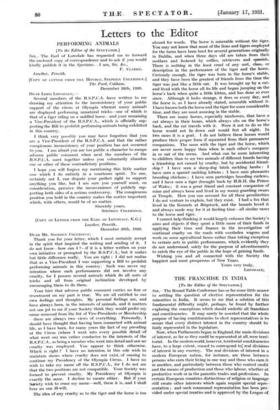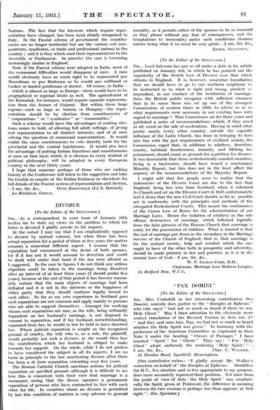THE FRANCHISE IN INDIA [To the Editor of the SeEcrAtoa..]
SIR,—The Round Table Conference has so far come little nearer to settling the question of elective representation for the minorities in India. It seems to me that a solution of this fundamental difficulty might, perhaps, be found by further exploring the conceptions which should underlie all franchisca and constituencies. It may surely be asserted that the whole. purpose of having constituencies to elect representatives is tcr -secure that every distinct interest in the country should be fairly represented in the legislature.
Now, when Parliaments began in England,the main divisions of interest, as far as they could be represented at all, were terri-: torial. In the modern world, however, territorial constituencies have, to a large extent, ceased to correspond to real divisions of interest in any country. The real divisions of interest in a modern European nation, for instance, are those between. persons who earn their living in one way and those who earn it in another, and particularly between those who control credit'
and the means of production and those who labour, whether at productive work or in the parasitic trades and professions. In certain European countries distinctions of religion or language still create other interests. which. again require special repre-• sentation ; and such communal -representation has been pro- vided under special treaties and- is approved by the League of, Nations. The fact that the interests which require repre- sentation have changed, has been most dearly iteognized 'in Italy. In the Fascist scheme of government the constitu- encies are no longer territorial but are the various enti (cor- porations, syndicates, or trade and professional unions) in the country ; and it is they which send their representatives to the Assembly or Parliament. In practice the case is becoming increasingly' similar in- England.
Now, if the Fascist-scheme were adopted in India, most of the 'communal difficulties would disappear it once. • A man would obviously have as much right to be represented qua Mussulman or qua Brahman as he would qua millhand or banker or landed gentleman or doctor: Of course, in India- -which is almost as large as Europe—there would have to be geographical or regional limits as well. The agriculturist of the Kamatak, for instance, would require separate representa- tion from the farmer of• Gujarat. • But within those large regions—each as large as Austria or Hungary—the repre- sentation should be by election from constituencies of
corporations" or " syndicates " or "communities."
Such a scheme would have the advantages of making elec- tions easier to hold, of allowing full adult suffrage, of giving real representation to -all distinct interests, and of at once solving the• question of communal representation. It - would enable the same constituencies to vote directly both for the provincial and the central legislatures. It Would also have the advantage of putting Indian franchises and constituencies at once on that basis which, it is obvious to every student of political philosophy, will be adopted- in every European country in the next thirty years.
I hope- that someone perhaps of- those who are making history at the Conference will listen to the suggestion and take the trouble to enquire at the Italian Embassy or elsewhere for full details of the Fascist system of representation-and election.





































 Previous page
Previous page